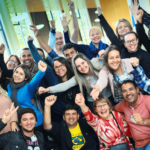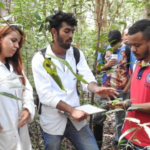
Karlo Ojok, Josphert N. Kimatu, James Mutambo, Lawrence Okidi, Samuel Ruhiu, Satu Määttänen & Eija Laitinen
The demand for higher education in sub-Saharan Africa (SSA) is high, with the labour market requiring skilled, knowledgeable and adaptable graduates capable of contributing to economic and social development. Pedagogical knowledge and skills are critical for teachers to deliver the curriculum optimally (McInerney & McInerney, 1998), and to produce high-quality graduates suitable for labour market needs. However, educators in African higher education institutions (HEIs) are faced with multiple challenges in delivering effective teaching and learning (Walker, 2006).
As their colleagues in many parts of the world, teachers in SSA have traditionally been regarded as transmitters and learners as receivers of knowledge. However, this paradigm is now shaken up with calls to reform the pedagogical practices in SSA from teacher-dominated to learner-centered methods to improve the quality of education (Altinyelken, 2010). It has become prudent that teaching is not only to transfer knowledge but also skills and attitudes that enhance the innovation and development of the learner (Freire, 1998 cited in Mabingo, 2014).
Considering the continued challenges with graduate employability in SSA (Monga et al., 2019), there is an urgent need to adopt innovative approaches to teaching and learning within HEIs. We postulate that the implementation of student-centered learning methods could contribute to addressing these challenges. This article discusses the status quo of teaching and learning in African HEIs, and the knowledge required to facilitate an educational paradigm shift.
The dominant teaching and learning model in sub-Saharan African HEIs
Paolo Freire (2000) called teacher-directed learning where teachers are merely seen as transmitters of knowledge, “the pedagogy of the oppressed”. Unfortunately, this is the dominant pedagogy in sub-Saharan African HEIs. One reason for the prevalence of the teacher-directed learning approach is probably its convenience; the approach is time and effort-saving and suitable for large classes (Emaliana, 2017). However, the approach comes with various shortcomings.
The pedagogy of the oppressed utilizes the concept of “banking” in education (Freire, 2000). In this context, banking refers to a teaching and learning approach grounded on the assumption that teachers are the authorities in their fields, transmitting knowledge and wisdom that learners should absorb as it is, with limited questioning. Learning outcomes are expressed in quantitative rather than qualitative terms, with little concern for the students’ true understanding of the topic, leading to surface learning (Postareff et al., 2007). Banking promotes a culture of rote learning and memorization at the expense of deep reflective learning, critical thinking and problem-solving.
The pedagogy of the oppressed signals asymmetric power relations, implying that a teacher is not only the sole source of knowledge but also wields full authority in the teaching and learning environment (Freire, 2000). The educator controls virtually every learning experience, and students’ roles and activities are minimal. For example, questions asked by students can be answered directly without encouraging students to think and be involved in finding solutions (Emaliana, 2017). Hence, teacher-directed learning nurtures a spirit of unproductive competition and individualism among learners due to limited opportunities to think and interact (Emaliana, 2017).
Based on the above, we argue that in teacher-directed learning, the teacher’s narrative dominates the learning process without an active role for the learners. However, the purpose of higher education should be to develop critical beings who are involved and personally engaged. The idea of learners’ inclusion and lifelong learning is part of the concept of student-centered methods (Barnett, 1997 cited in Walker, 2005).
The need for participatory learning
Existing educational professions need to evolve, and new professions need to be generated in order to meet the changing world and educational demands. According to Kunnari (2018), these demands call for HEIs and teachers to rethink their professional practices and to improve the current quality of teaching to effectively enable learners to acquire relevant skills and competencies to face the changing world and work without difficulties.
Effective teachers are expected to create a quality teaching and learning environment by promoting intellectual quality and the significance of learning experiences (State of NSW, 2006). In the context of this paper, a quality learning environment refers to a pedagogy that creates classrooms where students and teachers work productively with a clear focus on learning, while intellectual quality refers to a deep understanding of important concepts, and the development of new skills and ideas. Significance implies pedagogy that helps to make learning meaningful and important to students in their lives beyond school contexts. For this to be achieved, HEIs and teachers need to move from teacher-directed lessons to more participatory and collaborative learning that builds upon student participation, interactive dialogue, and from the teacher questioning of students to students generating their own questions (Hakkarainen, 2009; Larrivee & Cooper, 2006). This change entails a new type of understanding of institutions and teachers’ professional practices and strategies to continually be improved. We observe that this pedagogical paradigm shift involves learning for life and profession, as opposed to the existing exam-passing practice in many sub-Saharan African HEIs.
Importance of understanding educators’ perceptions of teaching
Teachers’ conceptions of teaching influence the teaching approaches employed (Postareff et al., 2007), and educators often are interested in maintaining the status quo. Our observations indicate that different teachers perceive teaching differently. Some perceive teaching as imparting structured knowledge thereby adopting the teacher-centered approach, while others conceive teaching as facilitative, thereby employing a student-centered approach.
All educators should be challenged to understand their learners individually and collectively and to creatively find ways of facilitating inclusive learning that is responsive to the learning needs of students. In many cases, this requires not only changes in the teaching methods but also changes in the educators’ mindset and overall educational goals.
The first step in transforming student-centered and participatory learning methods is understanding the status quo of educators’ perceptions of teaching. It is critical to determine the factors that maintain teacher-directed learning approaches on the one hand and those that contribute to implementing student-centered approaches on the other. This understanding provides opportunities for designing targeted interventions and training for teachers and other educational stakeholders.
We thus propose a research study focusing on perceptions of teaching and learning. The study should target all educational stakeholders: university administration, curricula developers, teachers, students and their parents, the ministry of education, commissions for university education and potential graduate employers. The research should cover topics such as educational policy, curriculum objectives, teaching resources, learning activities, attitude and skills impartation, pedagogical training methods and graduate employability.
Conclusions
Higher education within sub-Saharan African HEIs relies largely on teacher-directed methods that undermine student participation and the development of skills such as critical thinking and problem-solving. To improve graduates’ employability and make learning meaningful, there is a clear need for a paradigm shift towards student-centered teaching methods. To jumpstart this paradigm shift, it is critical to investigate factors that enable and facilitate the adoption of participatory student-centered methods among HEIs stakeholders.
Authors
Karlo Ojok, MA in Human Rights (2016) from Makerere University. Lecturer in the Department of Development Studies, Faculty of Business and Development Studies at Gulu University, Uganda.
Josphert N. Kimatu, PhD in Plant Molecular Epigenetics. Associate Professor, Researcher and External Examiner at South Eastern Kenya University, School of Pure and Applied Sciences, Department of Life Sciences.
James Mutambo, MSc in Management, Economics and Consumer Studies (2017) from Wageningen University and Research. Assistant Dean and Lecturer at the Department of Agricultural Economic and Agribusiness at Mulungushi University, Zambia,
Lawrence Okidi, MSc in Food Security and Community Nutrition (2016). Assistant Lecturer in Biochemistry and Biotechnology in the Department of Food Science and Postharvest Technology at Gulu University, Uganda
Samuel Ruhiu, PhD in Information Systems. Lecturer – Department of Computing and Informatics, Faculty of Science and Technology and Facilitator/Mentor – Computing for Development Lab (C4DLab), University of Nairobi.
Satu Määttänen, M.Sc. in Agr. & For. and M.Sc. in Biol & Env. Research Assistant at Häme University of Applied Sciences in the Bio Research Unit.
Eija Laitinen, PhD in Adult Education. Principal Research Scientist in the HAMK Bio Research Unit. AgriSCALE and PBL-BioAfrica Project Coordinator and leader of the HAMK Africa Team.
References
Altinyelken, H. K. (2010). Pedagogical renewal in sub‐Saharan Africa: the case of Uganda. Comparative Education, 46(2), 151–171. https://doi.org/10.1080/03050061003775454
Emaliana, I. (2017). Teacher-centered or Student-centered Learning Approach to Promote Learning? Jurnal Sosial Humaniora, 10(2), 59–67. https://doi.org/10.12962/j24433527.v10i2.2161
Freire, P. (2000). Pedagogy of the oppressed (M. Bergman Ramos, Trans.) (30th Anniv). Continuum (Original work published 1968).
Hakkarainen, K. (2009). A knowledge-practice perspective on technology-mediated learning. International Journal of Computer-Supported Collaborative Learning, 4(2), 213–231. https://doi.org/10.1007/S11412-009-9064-X
Kunnari, I. (2018). Teachers changing higher education: From coping with change to embracing change (Issue 34) [University of Helsinki]. http://urn.fi/URN:ISBN:978-951-51-4551-2
Larrivee, B., & Cooper, J. M. (2006). An Educator’s Guide to Teacher Reflection (6th ed.). Houghton Mifflin.
Mabingo, A. (2014). Teaching East African dances in higher education in the U.S.: reconciling content and pedagogy. Journal of Emerging Dance Scholarship, 2, 1–37. http://hdl.handle.net/10570/4021
McInerney, D. M., & McInerney, V. (1998). Educational psychology : constructing learning (2nd ed.). Prentice Hall.
Monga, C., Shimeles, A., & Woldemichael, A. (2019). Creating Decent Jobs: Strategies, Policies and Instruments.
Postareff, L., Lindblom-Ylänne, S., & Nevgi, A. (2007). The effect of pedagogical training on teaching in higher education. Teaching and Teacher Education, 23(5), 557–571. https://doi.org/10.1016/j.tate.2006.11.013
State of NSW. (2006). Quality Teaching in NSW Public Schools: A Classroom Practice Guide (2nd ed.). State of NSW, Dept. of Education and Training Professional Learning and Leadership Development Directorate. https://maryland-p.schools.nsw.gov.au/content/dam/doe/sws/schools/m/maryland-p/localcontent/qt_classroom_practiceguide.pdf
Walker, M. (2006). Higher Education Pedagogies : A Capabilities Approach. Society for Research into Higher Education, Open University Press.





